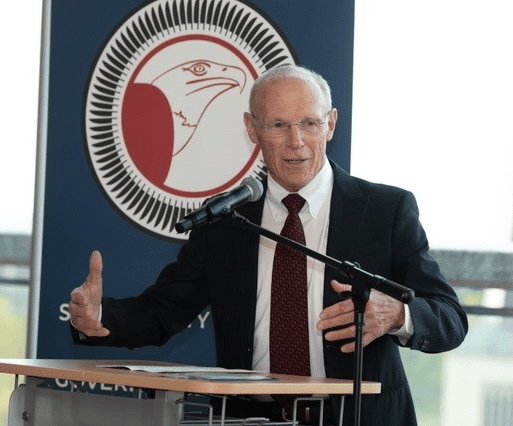For nearly four decades, Dr. Joseph Kalt, Ford Foundation Professor of International Political Economy at the John F. Kennedy School of Government, Harvard University, has led the Project on Indigenous Governance and Development to support Indigenous people with the critical tools to govern their communities effectively and strengthen economic, social, and cultural fabrics.
This April, in Toronto, Dr. Kalt will join leaders in developing Indigenous economies, at the 8th Annual FNMPC Conference: Valuing Reconciliation in Global Markets. As a professor of international political economy, Joseph’s expertise will bridge academic research and practical applications, offering delegates actionable roadmaps to leverage governance, partnerships, and investment strategies to enhance Indigenous participation in global markets
In anticipation of the upcoming conference, we had the chance to ask Dr. Kalt some questions about his work at the Harvard University project on Indigenous Governance and Development and how Indigenous values translate to commercial success.
Question: Are there examples of Indigenous communities playing pivotal roles in cross-border trade or international markets, and what can we learn from their success?
Cross-border trade by Indigenous nations in North America is modest but growing, with important activity in natural resources, agricultural and food products, consumer goods, tourism, and professional services. In a number of sectors, it often goes unrecognized that First Nations and US tribes are “players” in major international markets. Thus, for example, because of the cross-border structure of the North American electricity transmission grid and the effectively perfect fungibility of electrons, buying and selling of power that utilizes the grid brings Indigenous power providers and consumers into international trade. Substantial untapped opportunities exist in this arena. Similarly, the effective fungibility of oil, gas, and many other natural resources necessarily puts Indigenous nation- and private Indigenous-owned business into international markets. Examples here range from standout cases such as the Southern Ute Tribe’s on and offshore oil and gas companies, to hundreds of agreements and companies involving Canada’s and Australia’s Aboriginal communities in minerals development, to Māoris’ ownership share in New Zealand’s largest seafood exporting corporation.
Question: With increasing attention on securing critical minerals and supply chain resilience in North America, how can Indigenous Nations better position themselves and benefit from these geopolitical priorities?
My research and advisory work with Indigenous nations, communities, enterprises and leaders points to the limited value of mere “reconciliation” and “free, prior and informed consent” (FPIC). Instead, progress that both improves the wellbeing of Indigenous peoples and ensures sustainable enterprises and operations for all stakeholders is most likely when:
1. Indigenous community participation takes place within a framework that recognizes those communities as governing authorities, and
2. Private Indigenous enterprise participation takes place via formal contractual and corporate structures. This entails concrete responsibilities for institution building by both Indigenous and non-Indigenous decision-makers on both “sides of the table.
Question: What are you looking forward to most at the upcoming FNMPC conference Valuing Reconciliation in Global Markets?
Responsible decision-makers are showing the way forward to full and highly sophisticated participation by Indigenous nations, individuals, and businesses in international trade. “Reconciliation” is helpful in opening a path forward, but progress will mean that parties on both sides of the table will have to “walk the walk,” not merely “talk the talk.” The FNMPC conference is critical for sharing knowledge and experience in support of this challenge.
Join Dr. Kalt, and other globally recognized leaders in Indigenous economic development by registering now at: fnmpc.ca/conference/register
